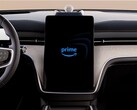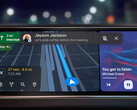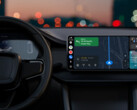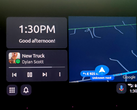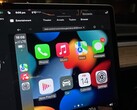With the 2024 Lincoln Nautilus going on sale this past week, parent company Ford once again showcased its panoramic cockpit display, which spans from the driver's side to the passenger side of the dashboard. Notably, the infotainment system is now powered by Android Automotive, complete with pre-installed Android apps. However, unlike the Android Automotive (a.k.a Google built-in) seen in cars like Polestar and Volvo, Ford has customized the UI, much like smartphone manufacturers do with Google's stock mobile OS.
Previously, Ford utilized its Sync interface, built on top of QNX, which powers over 235 million vehicles' infotainment systems on the road today. Like Ford Sync, QNX supports both Apple CarPlay and Android Auto, which rely on a user's smartphone and are facilitated by the car's operating system. Some readers may recall that the ill-fated BlackBerry PlayBook Tablet was the first time its QNX operating system made its public debut.
Android Auto and Android Automotive/Google built-in differ in that the latter is a full-fledged embedded operating system that runs natively on the car's computer systems, managing all telemetry shown on the driver's dash and other systems. In addition to Ford, automakers integrating Google's new car operating system into their vehicles include Volvo, Polestar, Honda, GM, Cadillac, Renault, Nissan, Buick, and Chevrolet. Apple's equivalent, known as "next-generation Apple CarPlay," is set to be introduced in Porsche and Aston Martin vehicles (among other makers yet to be named) this year.
With car buyers showing a clear preference to have a smartphone-like experience in their cars, the arrival of their fully embedded car operating system variants seems poised to sideline QNX and other embedded car operating systems. Further developed by BlackBerry following an acquisition in 2010, QNX is a UNIX-based operating system that once powered the company's first and last consumer tablet. BlackBerry, formerly known as RIM (Research in Motion), was once the leading smartphone maker globally but experienced a rapid decline due the rapid rise of the iPhone following its launch in 2007 and subsequently the rise of Android too.
Despite BlackBerry's smartphone business demise, QNX, along with its software security expertise, has kept the company afloat – in 2023, the company’s gross revenue was in excess of $800 million and still has around 3,000 staff on its books. The arrival of next-generation Apple CarPlay and Android Automotive may evoke an unfortunate sense of déjà vu for the Canadian company. Although BlackBerry tried to downplay Toyota's loss as a customer back in 2021 saying it was more focused on fully autonomous vehicles, it has since seen its QNX market share decline from 18% in 2020, to 14% in 2022 as Google has made inroads. By 2025, S&P Global forecasts that BlackBerry will see its share of the automotive market embedded operating systems decline to just 5%.
A key advantage that may keep QNX relevant is its support for both Apple CarPlay and Android Auto interfaces while simultaneously allowing car manufacturers to retain full control over their systems, a factor that some car makers may value. However, Android Automotive may pose a greater threat to BlackBerry's QNX, as Google's open approach to software usage gives companies like Ford control over the look and feel of Android Automotive and tailored to each of its brands, and even within vehicle product lines. While Android Automotive-equipped cars also support Apple CarPlay, it's uncertain whether Apple will reciprocate by supporting Android phones, Android Auto UI, and apps in the upcoming Porsche, Aston Martin, and other vehicles.
Historically, this seems unlikely. It's rare for Apple to license its operating systems to other OEMs, leading to speculation that this move may be related to Apple's long-in-development Apple Car project, potentially serving as a way to recoup some of that investment. Expecting Apple to allow automakers to modify its UI, let alone support Android Auto, seems improbable. However, Apple clearly feels it needs to make a play in the embedded software systems space given Google's growing popularity among automakers. Apple, which is still reported to be working towards a new 2028 launch for its Apple Car, may find value in the sensor and telemetry data from vehicles running its operating system for its own project.
While the outlook looks gloomy yet again for BlackBerry, fortunately it has diversified into other industries and business interests since the decline of its smartphone business. In addition to its QNX embedded OS being used in cars, it's also utilized in other IoT applications across various industries. Its encryption and security software, a key feature of its BlackBerry smartphones, has found other applications in enterprise. This diversification may prove invaluable as it confronts yet another disruption to one of its key businesses from some all too familiar adversaries.
Source(s)
Own








